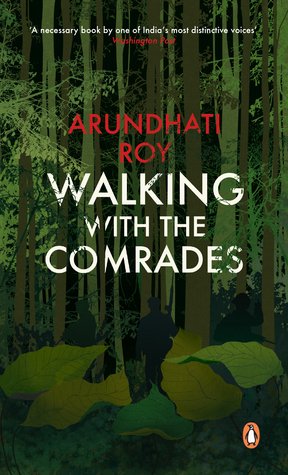Walking with the Comrades

Rating: 4.3/5
Author: Arundhati Roy
Publisher: Penguin Books, India
Publishing Date: 24th May 2011
Language: English
Genre: Non-Fiction
ISBN-10: 014312059X
ISBN-13: 978-0143120599
Format: Paperback
Pages: 240
Cost: Rs. 120 (Kindle Edition), Rs. 819.98 (Paperback), Rs, 3,333 (Hardcover)
Plot:
In this fiercely reported work of nonfiction, internationally renowned author Arundhati Roy draws on her unprecedented access to a little-known rebel movement in India to pen a work full of earth-shattering revelations. Deep in the forests, under the pretence of battling Maoist guerrillas, the Indian government is waging a vicious total war against its own citizens- a war undocumented by a weak domestic press and fostered by corporations eager to exploit the rare minerals buried in tribal lands.
Review:
Arundhati always had a compassionate side towards Maoists: it can be seen in many of her books. This time, she goes, spends time with them, among them, and brings their side of the story to the world. She long anticipates this meeting with the Naxalites:
“The terse, typewritten note slipped under my door in a sealed envelope confirmed my appointment with ‘India’s single biggest internal security challenge’. I’d been waiting for months to hear from them...”
In early 2010, Arundhati Roy travelled into the forests of Central India, homeland to millions of indigenous people- Maoists or Naxalites, a shadowy, revolutionary guerrilla force with tens of thousands of cadres. She sits down with them, face-to-face and discusses matters of national importance. The result is this powerful and unprecedented report from the heart of an unfolding revolution.
The thickly wooded states of Chhattisgarh and Jharkhand in central India are home to millions of indigenous tribal peoples. Long neglected by the Indian state because of their inaccessibility and marginality, these areas gradually became the hot-spot for left-wing revolutionaries. These disappointed men and women are scornful towards the current government and their theory of privilege. They are committed to armed revolution, but have also dedicated themselves to working for and with the tribals to improve their lives.
She condemns the current government has armed and paid groups of tribals to inform on Maoists, setting into vicious cycle of killings and retaliation that has claimed hundreds of lives. Roy’s biggest charge is that Operation Green Hunt- the name of the concerted military campaign against the Maoists
Roy takes readers to the unseen front lines of this on-going battle, depicting her months spent living with these rebel guerrillas in the forests. In documenting their local struggles, Roy addresses the much larger question of whether global capitalism will tolerate any societies existing outside of its colossal control.
About the Author:
Arundhati Roy was born in 1960 in Kerala, India. She studied architecture at the Delhi School of Architecture and worked as a production designer. She has written two screenplays including Electric Moon (1992) that was commissioned by Channel 4 television.
Her first novel ‘God of small things’ won the Booker Prize for Fiction in 1997. An immediate bestseller, the novel was published simultaneously in 16 languages and 19 countries but caused controversy in India for the description of a love affair between a Syrian Christian and a Hindu 'untouchable'. She is also the author of several non-fiction books including: The Cost of Living (1999)- a highly critical attack on the Indian government for its handling of the controversial Narmada Valley dam project and for its nuclear testing programme; Power Politics (2001)- a book of essays; and The Algebra of Infinite Justice- a collection of journalism. The Ordinary Person's Guide to Empire was published in 2004. She has since published a further collection of essays examining the dark side of democracy in contemporary India ‘Listening to Grasshoppers: Field Notes on Democracy’ (2009).
Her latest book is ‘The Ministry of Utmost Happiness’ (2017), her second novel. It was longlisted for the Man Booker Prize and, in the US, was a finalist for the National Book Critics Circle Award. For her work as an activist she received the Cultural Freedom Prize awarded by the Lannan Foundation in 2002.















































